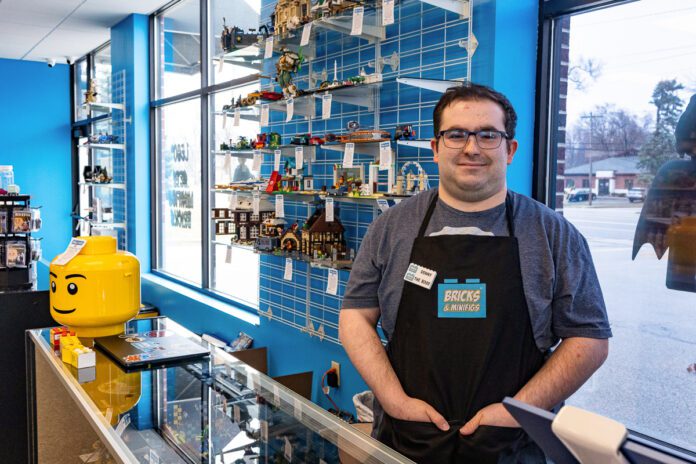TOLEDO – A bright display welcomes creative builders of all abilities and ages to Bricks & Minifigs, a Lego franchise reseller with its first 419 location at the intersection of Talmadge Rd. and Sylvania Ave.
New store-goers walk through a gauntlet of featured homages to pop icons, from Harry Potter and Stranger Things to Star Wars, all made of Lego blocks.
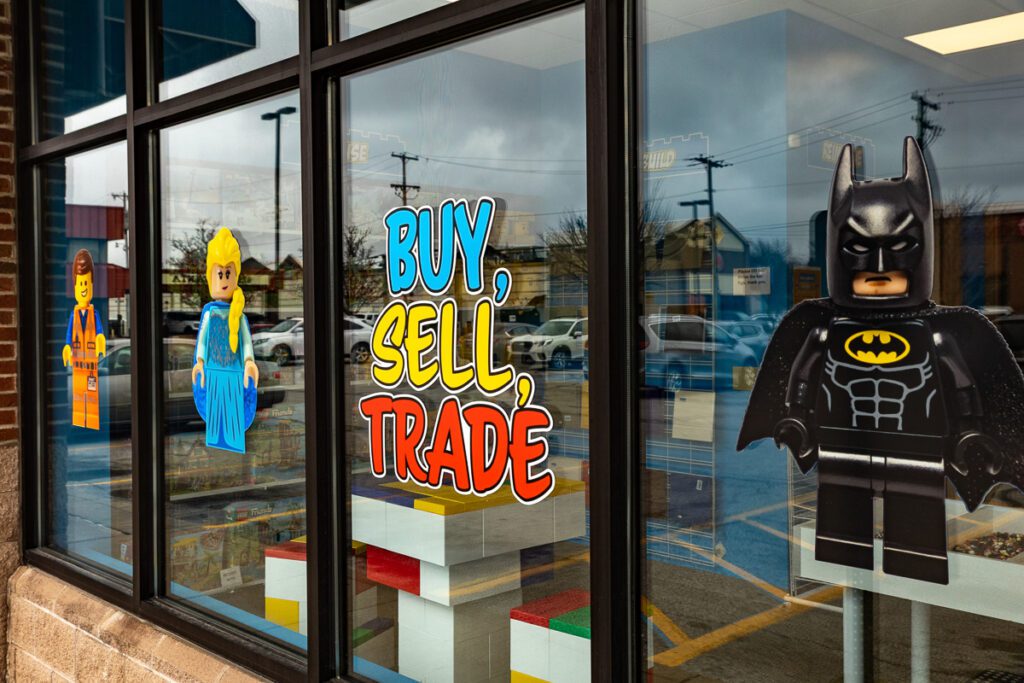
The store is the brainchild of Donny Stewart, 24, who opened up his first business in late November 2024.
“March has already been more profitable than last month,” he beamed, adding that retail stores generally don’t make a profit for the first seven years of their existence.
When asked why he wanted to open the store, he answered, “To support myself. Live on my own.”
What Stewart was hoping for was not so different from what most 20-somethings want: independence, to live life on his own terms and to have a job worth waking up for in the morning.
“I’m autistic,” he explained. “I never thought I would end up in a group home, but the possibility was there.”
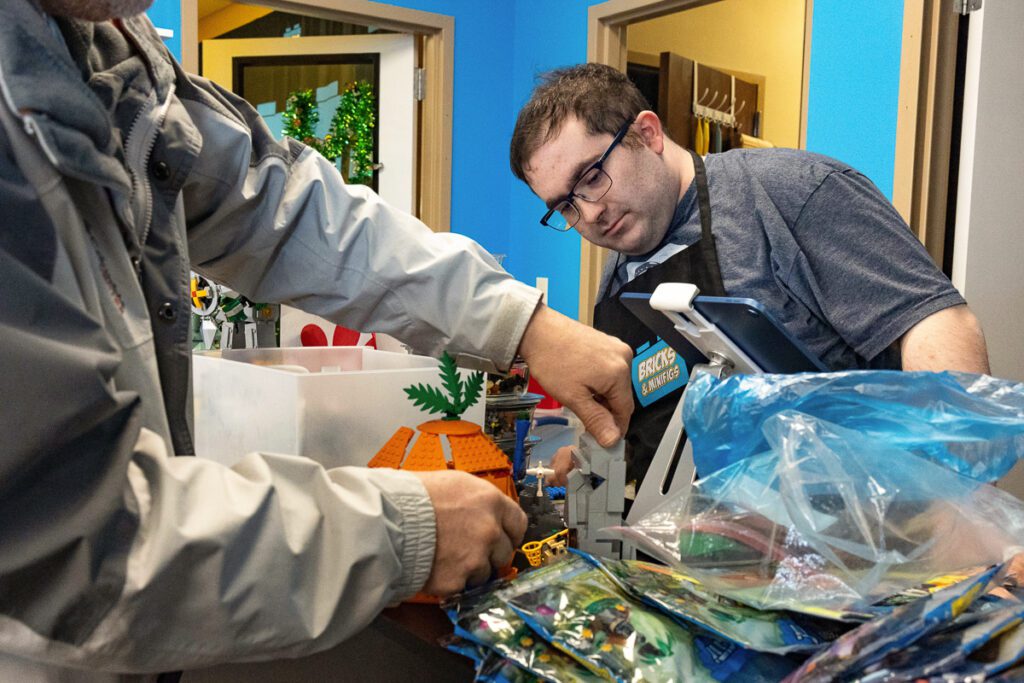
Stewart opened the business with his mother, Shanyn Stewart, whom he introduced as a serial entrepreneur and his previous employer.
“He probably didn’t tell you he’s trained in doing taxes,” said Shanyn Stewart, a certified public accountant (CPA) who owns Advanced Accounting, a firm in Bedford, Mich.
The firm deals with business owners, and Shanyn Stewart said both of her children were not too keen on continuing the tax business.
“My son, Donny, came to me and said, ‘I want to do something that I love.’
“People don’t do that,” she retorted, and offered her son a way to prove himself. “If you can show me how to monetize your hobby, then I’ll get behind you.”
“He came to me with a full business plan and said, ‘My Lego collection has appreciated more than your commodities portfolio.’”
Surprised at the viability of the Lego business model, she admitted, “And it has!”
Appreciating hobbies
A researcher on the subject, Victoria Dobrynskaya, who received her Ph.D. from the London School of Economics and Political Science, spoke as one of the two authors in the 2021 a study titled “LEGO: The Toy of Smart Investors.”
“Tens of thousands of deals are made on the secondary LEGO market. Even taking into account the small prices of most sets, this is a huge market that is not well-known by traditional investors.”
The article looks into the many attributes of Lego that make them good investments, and ultimately estimated an annual 10-11 percent return on investment for Legos.
“You could spend $300-400 just for Jango [Fett]. It just depends,” said Al Koepplinger, of Port Clinton, who traveled 50 minutes to trade his SpongeBob, Bikini Bottom pineapple Lego set, along with a Star Wars set, for store credit at Toledo’s Bricks & Minifigs.
“Together they went for $130,” he said. “It’s better here [at the store] instead of just sitting in the drawer.”
Donny oversaw the trade, and when Koepplinger tried to get a better deal, Donny shrugged with a half-smile, and said in true pawnshop fashion that he couldn’t go lower for the bottom line of his store.
An amicable trade was reached, and then Koepplinger continued to peruse what the rest of what the store had to offer.
Glass cases with rows of specific Lego characters [aka’ed as minifigs] form the front counter of the store, while shelving behind the counter features assembled sets with prices under them.
There are refurbished Lego sets, Lego sets designed by fans, and maybe the most popular and interactive option for kids are the bulk bins, where customers can mix and match parts.
Koepplinger said the individual characters, based on rarity and demand, can go for hundreds. In-store, the highest fetched value for an individual Lego character is a rare 2010 white version of Boba Fett, a Star Wars bounty hunter, priced at $300.
Online, Redditers post pictures of the same minifig, and the comments excitedly explain how to check the piece for authenticity.
“It was a Toy Fair exclusive with a limited production run of 150 copies,” Donny explained.
Koepplinger revealed he was more interested in building Legos with his wife than collecting, “Since we do a lot of the bulk, we just do a store credit and fill up a bin.”
Tables with raised sides hold the Lego pieces in the “bulk bins” while customers search through the vast piles of plastic available parts.
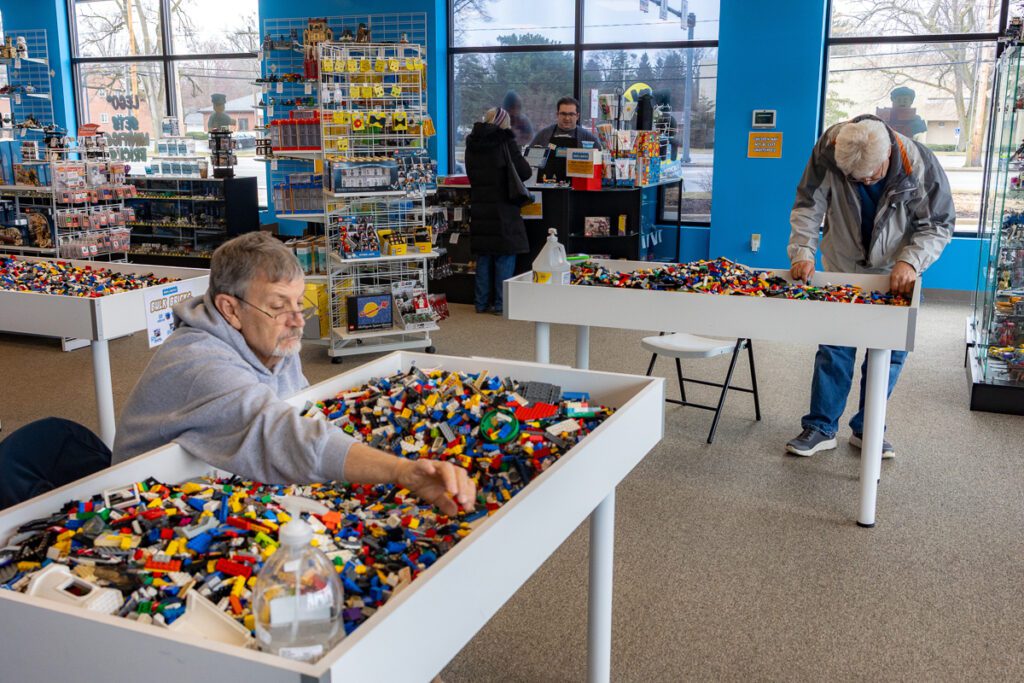
“I find the parts for retired Legos and put them together,” said Ken Noonan, of West Toledo, as he rummaged through the piles looking for specific connectors. “They’re sets they don’t make anymore.
“I find the instructions for the builds online, [and] then I find the parts to make them myself.”
Most of Noonan’s fascination revolves around classic car Lego sets, and he says he’s made about 20 car sets, six of them from Legos from the bulk bins at Bricks & Minifigs, so far.
Once a week Noonan stops by to see what’s changed in the store, while Koepplinger said he makes the trip to Bricks & Minifigs once or twice a week.
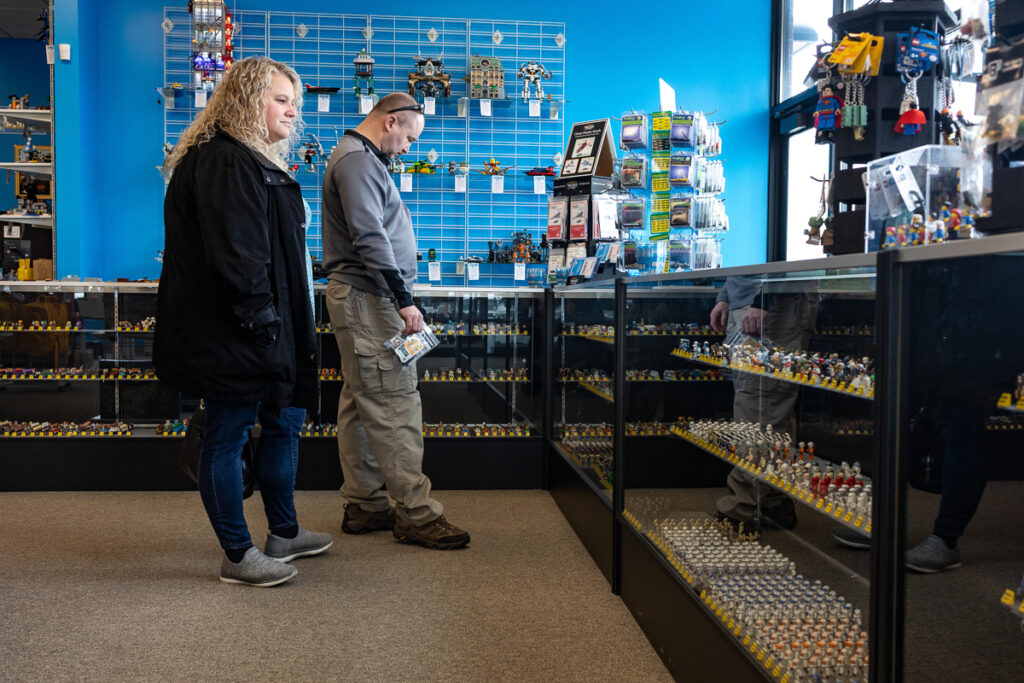

“Yesterday we saw a billboard, and at places like this you never know what you’re gonna find,” said Jennifer Rongers, of Virginia Beach, Va., who came to the store with her husband Sean Rongers.
The couple were visiting family in Oregon, Ohio when they came across the store’s advertisement.
As the two perused the selection of minifigs, Sean Rongers revealed his true hidden passion.
“Like she said, I’m looking for the older secondhand sets that I don’t have,” he said, but it turns out finding sets Sean Rongers doesn’t have may be more difficult than it sounds. I do [collect]. I have 524 sets of just Star Wars [Legos].”
The specifically elusive “white whale” for Sean Rongers has been the Star Wars Super Star Destroyer set, originally released in 2011. The 3,152-piece set has gained fame for its rarity and subsequent appreciation value. Originally, the Super Star Destroyer retailed for $399.99, and has since ballooned to a used price of $750 and can reach as much as $1400 if unopened.
In total, there are 987 Star Wars Lego sets, so he still has a ways to go.
History of Bricks & Minifigs
The first Bricks & Minifigs opened in Battle Ground, Wash. in 2010, and now there are 130 Bricks & Minifigs located across the United States and Canada. Part of the benefit of opening up a Lego franchise reseller was tapping into an already engaged fanbase.
Donny is part of this Lego fanbase, and it helped him contribute to his own stock by putting up many of his own sets for sale.
He just wants to do what he loves, but also bring joy to people. There’s never a day that he doesn’t come home, and he’s like, ‘Mom this kid was in today,’ or ‘these parents were in today and I got to see them smile.’
Shanyn Stewart
Shanyn Stewart mentioned that, before setting out as an entrepreneur, Donny had difficulty in high school and a university, simply because the environments were not made with him in mind.
“People weren’t kind to him because he was different.”
A mentor for Donny Stewart, Brian Winter, co-founder of SOAR Study Skills, a modern resource to help neurodivergent students perform better, recalled the main challenges Donny had in college.
“It was not an intellectual thing,” he said. “It really stood out to me that Donny is highly intelligent and he’s also very much connected with what’s transpiring on a global level.”
The challenges Donny faced on the daily were social cues, sensory sensitivities and a raw authenticity that put him at odds with going through the motions.
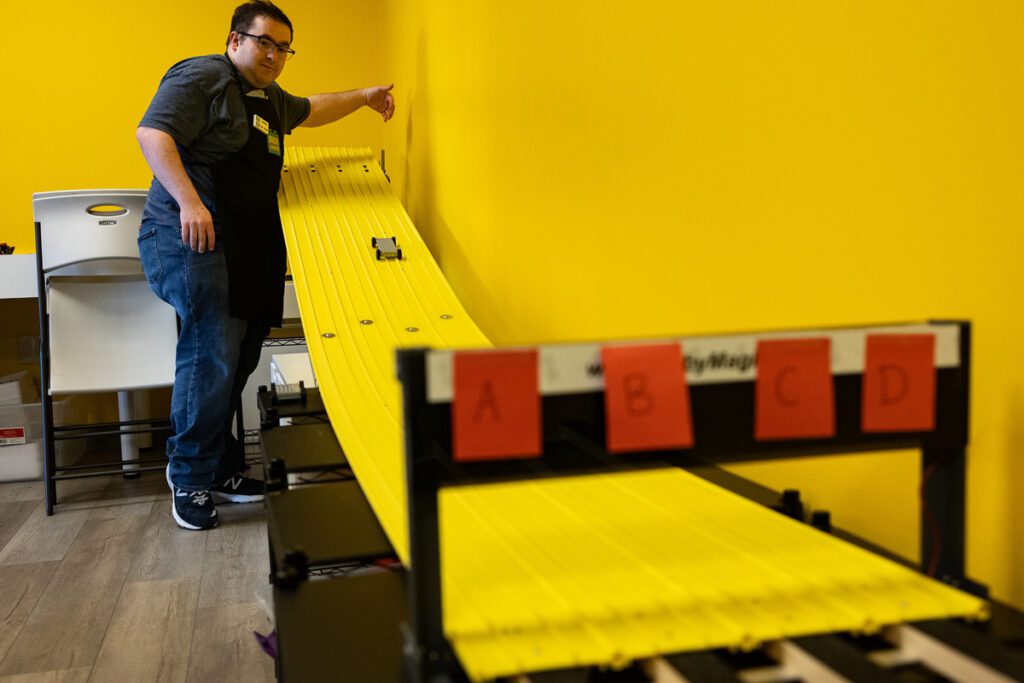
“Donny was aware that his sensitivities and his unique challenges were going to always be working against him in environments where he’s coming in as an employee, and he’s just expected to conform.”
Instead, Donny blazed his own way forward with Winter advising him on the best way he could manage his sensitivities within the store, which in turn attracted like-minded individuals.
“If you noticed, several of the team members are actually on the spectrum,” Shanyn Stewart said.
These considerations allowed many differently-abled people to enjoy the store at their own pace.
Accessibility and order were foundational considerations for Donny as he worked to make the store a reality, including making sure a wheelchair could access the bulk bins and installing sound-absorbing ceiling tiles and carpet to dampen the plastic clinking pieces, something that could overwhelm people with sensory sensitivities.
Changes to the standard Bricks & Minifigs layout presented complications for Donny Stewart, but he pushed forward, “I know what it feels like to be left out, and that’s…it’s just not fun.”
Already, six months into running the business, Donny has faced complications with the city of Toledo’s occupancy permits and issues with contractors, but he mentioned a few things that keep him grounded.
“I go to the gym early in the morning, and I can have an hour or so of just quiet.”
Donny also said improving his gut health with a proper diet helps him to maintain his composure. And about a decade ago, he had a breakthrough with Eye Movement Desensitization and Reprocessing (EMDR) therapy.
“It made day-to-day life much easier,” he said of the experience. Before receiving the therapy, “a slight change in my routine, [and] I would melt down.”
But now, Donny says he’s gained the ability to learn to be flexible, and he’s always learning.
Some days are harder than others, but he is able to see the impact his choices are making for people who enter his shop.
About a month ago, Donny said a “child was in a motorized wheelchair, and his face just lit up when he saw he was able to pull up to the tables and play with all the Legos.”
“Getting the store ready and starting the process, there was a lot of waiting and stress involved. So things like that made it worth it.”
At the beginning of June, Bricks & Minifigs plans to start hosting summer and day camps in coordination with elementary school teachers, and Donny and his mother have many more plans to help make Bricks & Minifigs a community-minded space for everyone.


